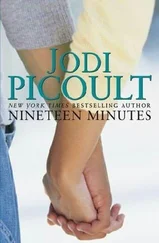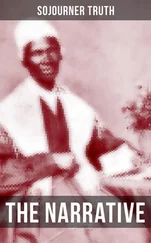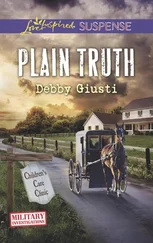“I’ll do it.”
Judge Gorman turned to Ellie, who seemed just as surprised to have uttered the words as he had been to hear them. “That’s certainly devoted of you, Counsel, but we’re looking for a family member.”
“I know,” Ellie said, swallowing hard. “I’m her cousin.”
When George Callahan stood up and roared his objection, I had to stop myself from seconding his motion. God, what on earth was I thinking? I came to East Paradise burned out; taking on this girl’s case was the last thing I wanted to do-and now I had volunteered myself to be Katie Fisher’s warden. Through a haze of disbelief I heard the judge rule against the prosecutor; set bail at $20,000 with provisions, and put me into a prison I’d created for myself.
Suddenly Frank and Leda were standing in front of me, Leda smiling through her tears and Frank staring at me with his solemn dark eyes. “You sure you’re all right with this, Ellie?” he asked.
Leda answered for me. “Of course she is. Why, she’s saving Katie for us.”
I glanced down at the girl beside me, still huddled in her chair. Since our brief interlude in the supply room, she hadn’t said a word. She flicked her gaze at me-I saw the bright blaze of resentment. Immediately, my hackles rose. Did she think I was doing this for my own health?
I narrowed my eyes, prepared to give a piece of my mind, but was stopped by a soft touch on my arm. An older, worn version of Katie decked out in full Amish costume waited for my attention. “My daughter thanks you,” she said haltingly. “I thank you. But my husband will not want an Englischer staying with us.”
Leda turned on her. “If Bishop Ephram said it’s all right to talk to an English lawyer, he’s going to say it’s all right for that same lawyer to meet the bail conditions. And if the whole community is willing to bend the rules for Katie’s welfare, Sarah, couldn’t you just once stand with them instead of by your stubborn husband’s side?”
In my whole life, I’d never heard Leda raise her voice. Yet here she was, practically yelling at her sister, until the other woman was cowering beneath the words. Leda slipped her arm through mine. “Come along, Ellie,” she said. “You’ll want to be packing up your things.” She started out of the courthouse, stopping once to look over her shoulder at Sarah and her daughter. “You heard the judge. Katie must be with Ellie at all times. So let’s go.”
I let Leda drag me out of the district court, and felt the heat of Katie Fisher’s stare burning into my back.
The road to the Fisher farm ran parallel to a creek, which then cut behind their land to form the rear edge of their hundred acres. This world was a kaleidoscope of color: kelly green corn, red silos, and above it all, a sky as wide and as blue as a robin’s egg. But what struck me the most was the smell, a mixture of notes as distinctive as any city perfume: the sweat of horses, honeysuckle, the rich tang of overturned earth. If I closed my eyes and breathed deeply, magic happened: I was eleven again and here to spend the summer.
We had dropped off Frank and picked up my suitcases, and now, an hour later, Leda was turning up the long driveway that led to the Fishers’ home. Staring out the window, I saw a pair of men driving a team of mules across a field. The animals hauled a tremendous, old-fashioned piece of equipment-God only knew what it was. It seemed to be tossing up tufts of hay that were already lying on the ground. At the sound of the car on the gravel, the bigger man looked up, hauled on the reins, and then took off his hat to wipe the sweat from his forehead. He shaded his eyes and glanced toward Leda’s car, then handed the reins to the smaller fellow beside him and took off at a dead run for the farmhouse.
He got there ten seconds after the car rolled to a stop. Leda and I stepped out first, then let Katie and Sarah out of the backseat. The man, broad and blond, began speaking words that made no sense to me-the first time I considered that the English Katie had so carefully put before the judge was not her first language, nor that of the people I was going to be moving in with. Sarah answered back, equally unintelligible.
My high heels wobbled on the gravel. I stripped off my suit jacket, uncomfortable in the heat, and studied the man who had come to greet us.
He was too young to be the Father from Hell who had been introduced in absentia in the courtroom. A brother, maybe. But then I caught him staring at Katie with a look that was anything but brotherly. I glanced at Katie, and noticed she was not looking at him the same way.
All of a sudden, in the run of language, there came a word I knew-my own name. Sarah gestured to me, smiled uncomfortably, and then nodded to the blond man. He took my suitcase from the trunk and set it down beside him, then offered me his hand to shake. “I am Samuel Stoltzfus,” he said. “Thank you for taking care of my Katie.”
Did he notice the way Katie stiffened at the possessive claim? Did anyone but me?
Hearing the metallic clop of hooves and harness behind me, I turned to see someone leading a horse into the barn. Wiry and muscular, the man had a thick red beard just beginning to sport streaks of gray. Beneath his black trousers he wore a pale blue shirt, the sleeves rolled up to the elbows. He glanced at us, briefly frowning at the sight of Leda’s car. Then he continued into the barn, only to reappear a moment later.
Ignoring everyone else, he went straight to Sarah and began to speak quietly but firmly to her in their language. Sarah bowed her head, a willow branch under a wind. But Leda took a step forward and began talking back to him. She pointed to Katie, and to me, and shook her fists. Her eyes snapping with frustration, she set her hands on my shoulders and shoved me forward, into Aaron Fisher’s scrutiny.
I had watched men step apart from themselves at the moment they were sentenced to life in prison; I had seen the blankness in a witness’s eyes when she recounted the night she was attacked; but never had I seen a detachment like I saw on that man’s face. He held himself in check, as if admitting to his pain might crack him into a thousand pieces; as if we were age-old adversaries; as if he knew, deep down, that he’d already been beaten.
I held out my hand. “It is a pleasure.”
Aaron turned away without touching me. He approached his daughter, and the world fell away, so that when he tipped his forehead against Katie’s and whispered to her with tears in his eyes, I ducked my head to offer them privacy. Katie nodded, starting for the house with her father’s arm locked around her shoulders.
In a tight knot, Samuel, Sarah, and Leda followed, talking heatedly in their dialect. I stood alone in the driveway, the breeze blowing my silk shell against my back, the sun sugaring new freckles on my shoulders. From the barn came the stamp and whinny of a horse.
I sat down on one suitcase and stared in the direction of the house. “Yeah,” I said softly. “It’s nice to meet you too.”
To my amazement, the Fisher home was not that much different from the one I’d grown up in. Braided rag rugs were scattered across the hardwood floors, a bright quilt sat folded over the back of a rocking chair, an intricately carved hutch held an assortment of delft china bowls and teacups. I think, in a way, I’d been expecting to step back into Little House on the Prairie-these were people, after all, who willingly set aside modern conveniences. But there was an oven, a refrigerator, even a washing machine that looked like one my grandmother had had in the 1950s. My confusion must have shown, because Leda materialized by my elbow. “They all run on gas. It’s not the appliances they don’t want; it’s the electricity. Getting power from public utility lines-well, it means you’re linked to the outside world.” She pointed to a lamp, showing me the thin tubing that piped in the propane from a tank hidden beneath its base. “Aaron will let you stay here. He doesn’t like it, but he’s going to do it.”
Читать дальше












